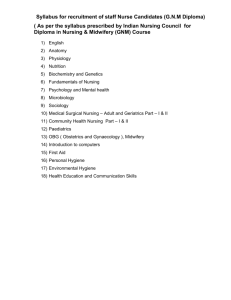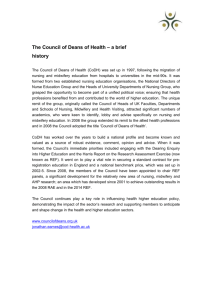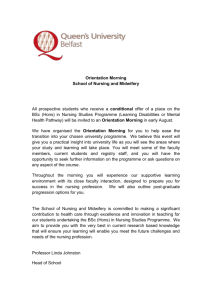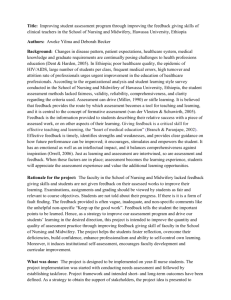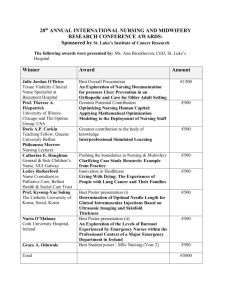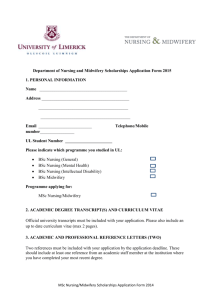UniHub - Middlesex University
advertisement
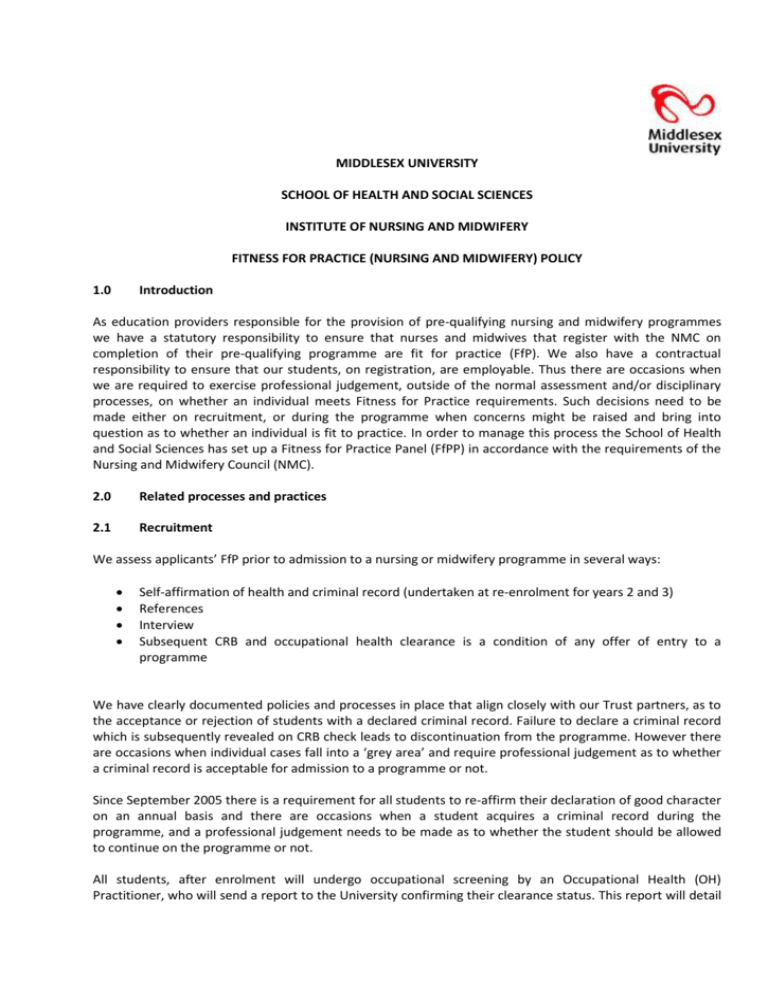
MIDDLESEX UNIVERSITY SCHOOL OF HEALTH AND SOCIAL SCIENCES INSTITUTE OF NURSING AND MIDWIFERY FITNESS FOR PRACTICE (NURSING AND MIDWIFERY) POLICY 1.0 Introduction As education providers responsible for the provision of pre-qualifying nursing and midwifery programmes we have a statutory responsibility to ensure that nurses and midwives that register with the NMC on completion of their pre-qualifying programme are fit for practice (FfP). We also have a contractual responsibility to ensure that our students, on registration, are employable. Thus there are occasions when we are required to exercise professional judgement, outside of the normal assessment and/or disciplinary processes, on whether an individual meets Fitness for Practice requirements. Such decisions need to be made either on recruitment, or during the programme when concerns might be raised and bring into question as to whether an individual is fit to practice. In order to manage this process the School of Health and Social Sciences has set up a Fitness for Practice Panel (FfPP) in accordance with the requirements of the Nursing and Midwifery Council (NMC). 2.0 Related processes and practices 2.1 Recruitment We assess applicants’ FfP prior to admission to a nursing or midwifery programme in several ways: Self-affirmation of health and criminal record (undertaken at re-enrolment for years 2 and 3) References Interview Subsequent CRB and occupational health clearance is a condition of any offer of entry to a programme We have clearly documented policies and processes in place that align closely with our Trust partners, as to the acceptance or rejection of students with a declared criminal record. Failure to declare a criminal record which is subsequently revealed on CRB check leads to discontinuation from the programme. However there are occasions when individual cases fall into a ‘grey area’ and require professional judgement as to whether a criminal record is acceptable for admission to a programme or not. Since September 2005 there is a requirement for all students to re-affirm their declaration of good character on an annual basis and there are occasions when a student acquires a criminal record during the programme, and a professional judgement needs to be made as to whether the student should be allowed to continue on the programme or not. All students, after enrolment will undergo occupational screening by an Occupational Health (OH) Practitioner, who will send a report to the University confirming their clearance status. This report will detail any adjustments that need to be made in order to enable the student to undertake the programme. The Health and Disability Panel (HDP, Appendix 1 – Terms of reference and membership)) will review this report and work in partnership with our Disability Services and clinical partners, to ensure that the adjustments are in place before the students commence their first placement. In very few cases it may be found that the adjustments cannot be made or are deemed not to be ‘reasonable’ in accordance with the disability Discrimination Act (DDA). If this proves to be the case the HDP will prepare a detailed report and submit to the FfPP for consideration and recommendation. 2.2 Assessment Student nurses’ Fitness for Practice is assessed throughout the programme as part of the Practice Assessment Tool (PAT). Students who fail to achieve the required standard will fail the module to which the PAT is attached, and a failed practice assessment is not compensatable. This is part of the normal assessment process and does not need to be referred to the FfPP. Student midwives are assessed in a similar way using the Clinical Practice Assessment Document (CPAD), which forms part of their practice modules. Those who fail to achieve the required standard will fail the module, which is not compensatable. All cases of suspected plagiarism will be reported to and investigated by Academic Registry, who will report their findings and decision to the Associate Dean, Teaching and Quality Enhancement. Serious cases of plagiarism that have been upheld by Academic Registry and found to be at level 2 or above, account for above 20% of the work or involve copying or buying the work from another student/source, will be referred to FfPP. 2.3 Student conduct and discipline The University Regulations for student conduct and discipline, as detailed at http://www.mdx.ac.uk/regulations/allprogs/studcon.htm applies to all nursing and midwifery students (pre or post-qualifying). When any breach of the regulations in relation to student conduct and discipline are being considered the requirements of the Nursing and Midwifery Council (NMC) in relation to good character and public protection will be taken into account. The disciplinary process for nursing and midwifery students clearly identifies the role of staff involved in relation to referring students to the FfPP. 3.0 Principles on which FfPP operates: Transparent, fair and consistent in the way in which professional judgements on fitness for practice are made Works in conjunction with the Regulations of the University Such judgements are not be left to one person to make in isolation Judgement is exercised in the same way as our Trust colleagues do, and by using the same criteria i.e. the NMC Guidance on Professional Conduct for Nursing and Midwifery Students, available at: http://www.nmc-uk.org/Documents/Guidance/NMC-Guidance-on-professional-conduct-for-nursingand-midwifery-students.PDF The process enables a decision to be made quickly This panel would only consider issues relating to Fitness for Practice that fall outside of the normal assessment and/or disciplinary processes and any member of academic staff can refer a student to FfPP, or refer to the FfPP for advice 3.1 Membership of FfP Head of Institute of Nursing and Midwifery (Chair) 4 senior members of Nursing and Midwifery academic staff Student Operations Manager 4 Trust representatives Supervisor of Midwives Independent member Administrative Officer, Institute of Nursing and Midwifery – Officer to FfPP On occasion, as part of induction or staff development activity, and with permission of the Chair, an observer may be present, but would not contribute to the decision-making process. 3.2 Terms of reference Under the direction of the Head of the Institute of Nursing and Midwifery the Fitness for Practice Panel are responsible for: 3.3 Providing professional judgements on applicants’/students’ fitness for practice where issues falling outside of existing admissions, assessment and disciplinary procedures are identified Recording and monitoring the cases that are dealt with by the Panel Advising policy and./or procedural amendments to the appropriate forum where required Providing professional advice on fitness for practice issues to School staff Mode of operation The FfPP meets three times a year to review the work of the panel, discuss policy issues and make policy decisions. Each case referred to the FfPP will be considered by a sub-panel that is responsible for arriving at a decision as to whether FfP is impaired and what the outcome should be (detailed in section 4.0). The FfPP operates under the guidelines provided by the NMC at http://www.nmc-uk.org/Educators/Good-health-andgood-character/. Each sub-panel will be chaired by either the Chair or Deputy Chair of the FfPP, composed of at least 4 members of FfPP and will include at least one member currently working in a senior clinical post (Band 7 or above). When a case concerning a midwifery student is being reviewed, then at least one member of the panel will be a registered midwife. The officer for FfPP will collate the evidence to be reviewed by the sub-panel, both from the referrer and the referee. The student/applicant who has been referred will be sent a referral letter outlining the cause for referral and a request for a reflective statement and any evidence that he/she wishes to be considered. Once the evidence from both sides has been collated it will be sent electronically and password protected to the student/applicant and members of the sub-panel. The subpanel will normally be expected to complete the review and notify the officer of their recommendation within 10 working days. The feedback from the sub-panel will be reviewed by the Chair or (in their absence) the Deputy Chair of FfPP and a letter will be send electronically and in hard copy to both the student and the referrer detailing the outcome of the review. If the sub-panel cannot reach a majority decision, then the Chair will send all documents to at least an additional 3 FfPP members to review. All case outcomes are reported back to, and monitored by, the full Fitness to Practice Panel. 4.0 Outcomes of FfPP Referrals A FfPP sub-panel who are considering whether the FfP of an applicant for a nursing or midwifery programme is impaired can make one of 2 decisions: To recommend that a place on a Pre-registration Nursing/Midwifery Programme is offered To recommend that a place on a Pre-registration Nursing/Midwifery Programme is not offered A FfPP sub-panel who are considering whether the FfP of an applicant/student who has not yet met the conditions of their offer, is impaired can make one of 2 decisions: To recommend that the conditional offer of a place on the Pre-registration Nursing/Midwifery programme is withdrawn. In this case the applicant/student will be invited to discuss their options for transferring to another non-professional programme To recommend that the conditional offer of a place on the Pre-registration Nursing/Midwifery programme is upheld. In this case the applicant may enrol, or the student may continue with their programme of studies. There may be conditions attached to this decision A FfPP sub-panel who are considering whether the FfP of a student who has been referred to the panel for unprofessional conduct is impaired can make one of two decisions: To recommend that the student is withdrawn from the Pre-registration Nursing/Midwifery, programme. In this case the applicant/student will be invited to discuss their options for transferring to another non-professional programme To recommend that the student is allowed to continue on the Pre-registration Nursing/Midwifery. There may be conditions attached to this decision A FfPP sub-panel who are considering whether the FfP of a student is impaired due to health/disability (and have been referred the case by the Health and Disability Panel, with their recommendations) can make one of two decisions: To recommend that the student is withdrawn from the Pre-registration Nursing/Midwifery, programme. In this case the applicant/student will be invited to discuss their options for transferring to another non-professional programme To recommend that the student is allowed to continue on the Pre-registration Nursing/Midwifery. There may be conditions attached to this decision A FfPP sub-panel who are considering whether the FfP of a student is impaired due to plagiarism (and have been referred the case by the Associate Dean, Teaching and Quality Enhancement, with the recommendations from Academic Registry) can make one of two decisions: To recommend that the student is withdrawn from the Pre-registration Nursing/Midwifery, programme. In this case the applicant/student will be invited to discuss their options for transferring to another non-professional programme To recommend that the student is allowed to continue on the Pre-registration Nursing/Midwifery. There may be conditions attached to this decision Any recommendation for discontinuation will be made to the Associate Dean, Teaching and Quality Enhancement, who will also be informed of any withdrawal of conditional offers. 5.0 Appeals 5.1 An appeal is a request from a student that a decision of the FfPP should be reviewed because it is believed that an injustice has occurred. A successful appeal results in the FfPP reconvening to review its decision in the light of the new information although it does not necessarily mean that the original decision of the FfPP is changed. All appeals must be made through the Officer to the FfPP 5.2 An appeal against a decision of the FfPP can only be made on the grounds that: I. The FfPP process was not run in accordance with the agreed policy II. There was an administrative error affecting the outcome III. There is additional and relevant evidence that was not seen or was not available at the time the decision was made. 5.3 A successful appeal will result in the case being re-submitted to a sub-panel of the FfPP with the inclusion of additional members. This sub-panel will be independently chaired by the Associate Dean, Teaching and Quality Enhancement. Developed by: Dr Kay Caldwell, Institute of Nursing and Midwifery Agreed by: Fitness for Practice Panel Approved by: NMET Review date: June 27th 2011 Next Review due: June 27th 2012 APPENDIX 1 MIDDLESEX UNIVERSITY SCHOOL OF HEALTH AND SOCIAL SCIENCES HEALTH AND DISABILITY PANEL PRE-REGISTRATION NURSING AND MIDWIFERY Terms of reference 1.0 Introduction The Health and Disability Panel functions as a sub-committee of the Fitness for Practice Panel and is established to provide a strategic direction across nursing and midwifery programmes with regard to the management and support for students with a disability or health issue (as identified by Occupational health). 2.0 Principles of Operation The Health and Disability Panel aims to ensure that: 3.0 The University complies with its duty of care to students and to those with whom they come into contact The University complies with the requirements of the Disability Discrimination Act Students with health and disability issues are not disadvantaged, nor put at risk Students with health and disability issues are treated with transparency and fairness Terms of reference 1. To ensure that students with health and disability issues are given appropriate support and all reasonable adjustments are made to support them on their programme. 2. To regularly review students (pre-registration Nursing and Midwifery) with health and disability issues affecting their programme, and maintain confidentiality of such discussions. 3. To support programme leaders with the monitoring of individual students. 4. To facilitate the smooth handover of relevant students between CFP and branch programme leaders. 5. To ensure parity and fairness of approach to individual students across the framework. 6. To consider occupational health reports that make recommendations and require adjustments in their programme, including practice placements, taking Fitness to Practice into consideration. 7. To refer cases to the Fitness to Practice Panel where occupational health report recommendations cannot be accommodated. 4.0 Mode of Operation The panel meets twice each year, in October / November (to consider occupational health reports of CFP nursing students / Midwifery students) and June (to review all cases). 5.0 Membership A Director of Programmes (Chair) Programme Leaders CFP, adult branch, child branch, mental health branch, BSc Nursing, BSc Midwifery PBLU representative Student Operations Manager Clinical colleague x 1 (E.g. Educational Lead) Members may also be co-opted for specific advice such as University Disability Service, Clinical Practice Facilitator from a specific speciality. Developed by: Marion Taylor, Director of Programmes, Chair of Health and Disability Panel Agreed by: Health and Disability Panel Approved by: NMET Review date: Next Review due:
